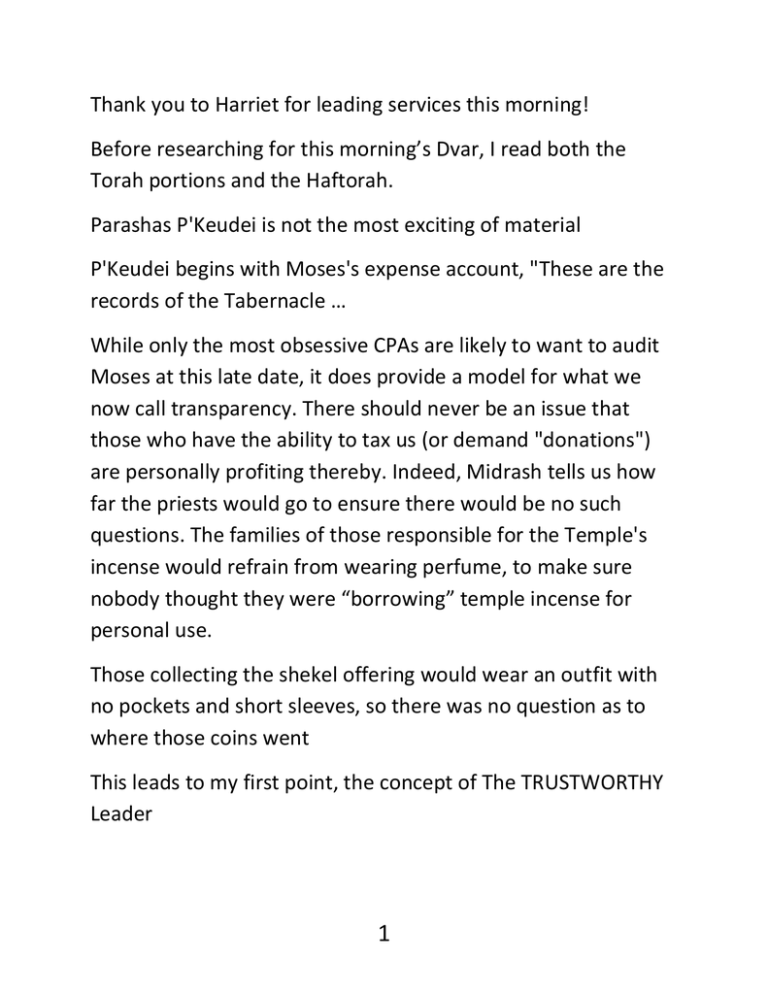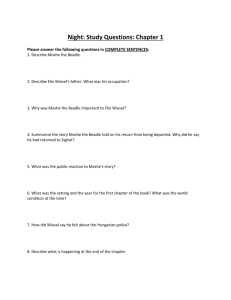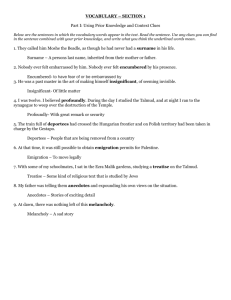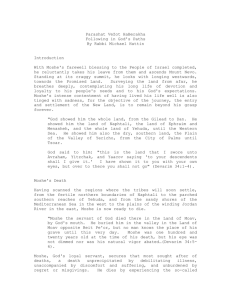Thank you to Harriet for leading services this morning! Before
advertisement

Thank you to Harriet for leading services this morning! Before researching for this morning’s Dvar, I read both the Torah portions and the Haftorah. Parashas P'Keudei is not the most exciting of material P'Keudei begins with Moses's expense account, "These are the records of the Tabernacle … While only the most obsessive CPAs are likely to want to audit Moses at this late date, it does provide a model for what we now call transparency. There should never be an issue that those who have the ability to tax us (or demand "donations") are personally profiting thereby. Indeed, Midrash tells us how far the priests would go to ensure there would be no such questions. The families of those responsible for the Temple's incense would refrain from wearing perfume, to make sure nobody thought they were “borrowing” temple incense for personal use. Those collecting the shekel offering would wear an outfit with no pockets and short sleeves, so there was no question as to where those coins went This leads to my first point, the concept of The TRUSTWORTHY Leader 1 In the movie "Good Will Hunting", the psychiatrist played by Robin Williams succeeds in getting through to Matt Damon's character after everyone else has tried and failed. He manages to bring out the real person rather than just the brashly arrogant and smart math wizard who keeps the rest of the world at arm's length. The reason why - articulated by the good doctor even before their first session - is that no therapy can begin without trust. Real self-awareness and self-discovery is only possible when the doctor and the patient trust each other. And so he sets out to establish trust with the troubled young man by being a real person instead of a "shrink", displaying anger, sharing intimate details of his own life, and even accepting influence in his own life from his patient. There is quite a bit of similarity between the good Doctor and Moshe Rabbenu (Moses, our teacher), the trustworthy man, or man [worthy] of faith. Moshe is the quintessential reliable person. He is both trusted by God, who says "...my servant Moshe, in all My house, he is the trustworthy one (ne'eman)" and by the Jewish people, who he took out of Egypt, through the split sea and to Sinai. He establishes at every turn that he cares more for others than for himself and he extends himself in unbelievable ways to care for the Israelites. 2 Yet, he is also a real person - he has a wife and children of his own, he makes the occasional mistake and has moments of self-doubt and anger. No one can doubt that everything Moshe has done for his people - from the very first day he struck down an Egyptian beating a Hebrew a slave to going back up Mount Sinai to convince God to forgive them for the Golden Calf establishes him as a trustworthy person, a man of faith. But it is very hard to trust, both then and now. Moshe asked the people to take extraordinary leaps of faith in trusting him: walking into the howling wilderness of the Sinai, accepting a revolutionary way of life brought down from Heaven. There were times when it seemed like it wouldn't work. Sometimes, they had no water, or aggressive armies were bearing down on them with swords and chariots, or it seemed like they could not obey all of God's laws. Sometimes, it seemed like they would just never get out of the desert. Only unbelievable patience and perseverance helped them make it. But at least they had Moshe. In our day, we have trusted politicians and leaders who have toppled off their pedestals. We have doubts about whether we are living our lives the right way and whether or not following the Torah as we understand it will make us happy. 3 We wonder whether or not we will ever understand what God wants from us. We are sticking our necks out to embrace a set of values and behaviors that much of the rest of the world thinks is weird, backward, or funny. It's not that we really think they're right, but with all the talking heads out there, who CAN we trust? Who is our Leader? I think it is instructive to notice that Moshe himself underwent a lot of criticism and was doubted frequently by the Israelites, despite the clear evidence that he had divine stature as a prophet and was God's chosen representative. At various times, he had to contend with rebellions, murmuring in tents and lots of groaning and chest-thumping about how he was leading the people astray. There were even times when they wanted to elect a new chief and go back to Egypt! It just shows that you can't always trust what "the people" want (we don't always know what's good for us) and that doubt and mistrust exist everywhere. Perhaps we can learn something from how Moshe himself handled these doubters. After the Golden Calf incident, Moshe moved his tent outside the Israelite camp. 4 In Sh'mot (Exodus) 33:8, the Torah says: "And when Moshe went out to the tent, all the people got up and stood erect in their own tent doorways and they watched Moshe until he went into his tent." Immediately after this, God's presence settled upon Moshe's tent and it was there (pre-Tabernacle) that He communicated with Moshe. The Talmud brings two interpretations of what was going on in the people's minds when they watched Moshe make his way to his tent. One opinion is that it was to Moshe's credit. As they stood in awe and respect, they said "Happy is the one who gave birth to him!" a compliment to both him and his mom. The other opinion, though, is that they were being profoundly cynical. They whispered to each other: "Look how fat his neck and face are. He is eating and drinking with our money!" In other words, they literally accused Moshe of padding his pocket with the people's tzedaka money. Though we as a people have a high tolerance for self-criticism, and the Torah and commentators are surely not above calling the people out when they sin or act inappropriately, this criticism seems to really have gotten under their skin. Rashi omits the negative interpretation, Rabbi Naftali tries to deny it and the Gemara itself, though it mentions it obliquely, seems hesitant to even say it out loud. 5 I can see why this behavior on the part of our people is embarrassing. Here we have Moshe, who has just convinced God NOT to destroy the Jewish people and who is working 24-7 to craft a future for his people -- and standing in their doorways, some total jerks are taking potshots that Moshe is spending too much money on lunch! Perhaps we could say that there were some unfortunate malcontents who never learn and are not indicative of how we would really feel. If we had been there, we would have been admiring Moshe and saying the good things. However, can we really say that? We, who live in a society where our political leaders and spiritual figures are constantly maligned in public (sometimes, but only sometimes, for good reasons) and where character assassination online, in the press and in courtrooms has been honed to a high art? Cynicism is a seductive whisper that is often unable to distinguish good from bad. According to the midrash, Moshe becomes aware of these murmured criticisms. But rather than getting angry, denouncing them or protesting his own innocence, he acts with virtue and dignity. He pro-actively declares that the financial statements from the building of the mishkan (Tabernacle) will be made publicly available. There will be complete transparency of all donations and costs. 6 How anyone could really have for one second believed that Moshe would take kickbacks while building the house of God is beyond me. But it's comforting to know that he personally accounted (with some oversight from a few others, such as Itamar) for every shekel collected and spent. The midrash goes on to describe a terrifying moment for Moshe. As he prepares the accounting, he finds that he has a record of 1,775 silver shekels being donated but no record or memory of how they were spent. He begins to tremble. Now, he worries, the people will say (and have a case to say) that I have stolen from them! The whole edifice of trust and trustworthiness will crumble, even though he is quite sure he did nothing wrong. At that moment, God reveals to him what he had forgotten. He needed exactly 1,775 shekels worth of silver to create the silver hooks (vavim ha-amudim) upon which the curtains of the Tabernacle were hung. The hooks were hidden behind the curtains and he had forgotten about them. With relief, the Torah writes "and the 1,775 were used for hooks for the beams, their heads covered in silver and plated." (Sh'mot 38:28) Moshe volunteers a public accounting to show that he is honest and the finances of the mishkan untainted. 7 But he does it not only for the malcontents and critics, but also for all the people, to give them pride and confidence in what they have built. And he does it also for himself, so that he can be sure that his own accounting is error-free. It is only after this nitty-gritty, time-consuming, banal process of counting is completed that the mishkan is really ready for “God”. Our financial integrity is a pre-requisite for God's presence to rest within us. This whole reading is about MONEY and STUFF, but more importantly it is also about PLANNING and REDEMPTION, and that is my second topic. Without a good plan we are not likely to succeed This is the same approach we should take to spirituality. Some people—not ones who come to our weekly minyan—say temple doesn’t do anything for me. It doesn’t move me spiritually. Well, yes if you are going to show up for shul once a year and sit there for 45 minutes, yes, I totally agree that your spiritual experience will be of a limited value. 8 What is required for spiritual success is repetitive work, plan to work, work your plan, just like the commitment that Moshe had in building the Mishkan. This is what Moshe required from himself and this is what he was trying to teach the Israelites. And this is what we should require of ourselves. We should challenge ourselves to commit to G-d in a serious manner on multiple occasions throughout the month, the week, or even the day. Moses had to do things PUBLICLY. Everyone was WATCHING. He couldn’t keep anything secret, and especially not the money and how it was used. Amazing right? Has our culture become too obsessed with recognition and publicity? As I read through various commentary on this week’s torah reading, the concept of recognition seemed to be a recurring theme. Think about all the events from the past that are NOT immediately visible on YouTube or posted on Facebook. Not anymore. I have friends who post their entire LIVES on Facebook, and not just kids, I mean ADULTS from 20 somethings to 50 somethings. 9 My wife celebrated her birthday this past week and was amazed at the DOZEN’s of positive congratulations she received on Facebook from people she hasn’t spoken to or seen in years. Now on the one hand there is nothing wrong with that. But on the other hand, there is something immodest and anti-spiritual about our entire youtube society today. We have become a youtube culture with individuals constantly promoting themselves Well Moses promoted himself, but did he really? Wasn’t he actually promoting the COMMUNITY? The youtube culture is a culture that promotes the individual. And while it is possible for an individual to achieve redemption, this week’s parshah tells us that there is a better path to redemption. Parshat pekudei teaches us that the path to redemption of the individual comes not through a glorification of the individual but through the individual’s communal participation. The word pekudei can mean to count. As in, eleh pekudei hamishkan, these are the countings of the mishkan. The Torah ends the Book of Redemption with a meticulous counting of all the gold, silver, and materials used in the mishkan. 10 This is a seemingly tedious way to end a book of redemption. Wouldn’t we expect a more exciting, Hollywood-like ending? But instead we are seeing a counting of all the silver and gold that was spent. So the answer is that is what the word pekudei can also mean to redeem. At the beginning of Exodus, Hashem tells Moshe go tell the Jewish people (3:16), “pakod pakadati etchem, I will redeem you.” Here the word pekod means to redeem. In fact, the Midrash tells us that this phrase “pekod pekadati” was a secret phrase passed down through Serach bat Asher and the tradition was that whatever prophet would come to the Israelites with this secret phrase, “pakod pakadati” would be the true prophet. That is a strange Midrash. I think it means that whoever understood the meaning of the words pekod pakadati would be able to redeem the people. 11 And Moshe understood the meaning of these words. He understood that pakod means a redemption that comes through a communal counting of the people. This is the message of Parshat Shekalim (of which we read a small portion today, since it is Erev Rosh Chodesh). It states in Parshat Shekalim that everyone must give a half shekel coin in order to be counted, “bifkod otam.” But we can also read it as saying that everyone must give a half shekel in order to be redeemed. In other words the redemption of the individual comes not through the glorification of the individual but through the participation in the communal building of a meaningful entity. So when God told Moshe say to the children of Israel, “pakod pakadati etchem— I will redeem you.” He is saying tell them that I will redeem you when you commit to something much larger than each of you. That is a fundamental message of redemption—the path to an individual’s redemption is through a community. 12 And it carries with it an additional responsibility for us as a community. Since communal participation is an individual’s path to redemption, we as a religious community must always strive to be as inclusive as possible and thereby help the individual join the community. The individual is best redeemed through the community; but true redemption for the community can only come when the community remembers to make space for the individual. We should not ask why the soul seeks redemption. Instead, we should ask how we can achieve it. And we can achieve it. All it takes is a constant commitment to the hard work of spirituality and a dedication to the recognition that our individual redemption will come through a communal redemption. And if we understand those two ideas then the path to redemption is very much achievable. Shabbat Shalom 13




